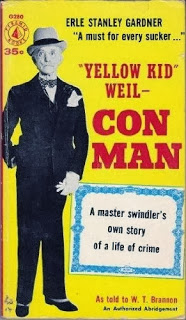
Found on the front endpaper of an American book on Abraham Lincoln -- this bookplate label advertising a used bookstore. This store was the first business of the still extant and flourishing Barron's textbook business and the owner started out mimeographing textbooks in the basement of the shop long into the night after the shop was closed. As Publisher's Weekly noted in 2011: 'In 1941, the after-hours mimeograph business became Barron's Publishing, and its first offering was the aptly named series Barron's Regents Exams and Answers...Seventy years later, the series is still going strong, albeit with some innovations—apps, e-books, and a subscription-based Web site—that could never have been imagined in 1941.'
He was still around and working in 2011 when he celebrated 70 years of business, which dates this label from the early 1940s. Of note is the broad range of business he was engaged in - used books, stationery, art supplies, records both classical and modern, gym wear and even new books...this kind of enterprise is still needed to survive in the book trade.

